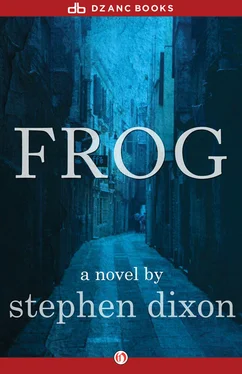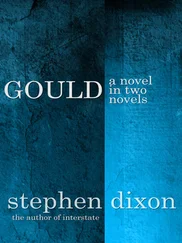Stephen Dixon - Frog
Здесь есть возможность читать онлайн «Stephen Dixon - Frog» весь текст электронной книги совершенно бесплатно (целиком полную версию без сокращений). В некоторых случаях можно слушать аудио, скачать через торрент в формате fb2 и присутствует краткое содержание. Год выпуска: 2013, Издательство: Dzanc Books, Жанр: Современная проза, на английском языке. Описание произведения, (предисловие) а так же отзывы посетителей доступны на портале библиотеки ЛибКат.
- Название:Frog
- Автор:
- Издательство:Dzanc Books
- Жанр:
- Год:2013
- ISBN:нет данных
- Рейтинг книги:5 / 5. Голосов: 1
-
Избранное:Добавить в избранное
- Отзывы:
-
Ваша оценка:
- 100
- 1
- 2
- 3
- 4
- 5
Frog: краткое содержание, описание и аннотация
Предлагаем к чтению аннотацию, описание, краткое содержание или предисловие (зависит от того, что написал сам автор книги «Frog»). Если вы не нашли необходимую информацию о книге — напишите в комментариях, мы постараемся отыскать её.
Frog — читать онлайн бесплатно полную книгу (весь текст) целиком
Ниже представлен текст книги, разбитый по страницам. Система сохранения места последней прочитанной страницы, позволяет с удобством читать онлайн бесплатно книгу «Frog», без необходимости каждый раз заново искать на чём Вы остановились. Поставьте закладку, и сможете в любой момент перейти на страницу, на которой закончили чтение.
Интервал:
Закладка:
“‘What about commercialism?’”
“Never had the chance. But let’s change the subject.” He took the letter from her and read “‘How do you teach?’ I say ‘Hi, my name is, nice to meet ya, now start with those lines or similar introductory or valedictory ones and write a short story of any length.’ Say, that gives me an idea for one, and just when I’ve been looking for it,” and he went downstairs. “My letter,” I said, but he’d already shut the door.
I looked at his wife, she raised her shoulders, so I tiptoed down the steps after him. He was typing away at a long table. It was a dark room, a small window over the table but not much light coming through it, even on this sunny day, probably because the window was almost at ground level. A reproduction of a Giacometti drawing of a face was right below the window, or maybe it was an original — I’d ask him. A painting by a child was next to it. The painting was signed by his oldest daughter and said at the bottom of it “Daddy writing again,” and showed a man at a table with his hands over his ears and his mouth open as if shouting. There was no other furniture in the room except a file cabinet to the left of the table with a huge dictionary on it. On the table, besides the manual typewriter and at one end of it the typewriter’s plastic cover, was a thesaurus, writing reference manual, ream of erasable paper (sixteen-pound weight), box of second-sheet paper, two fountain pens, bottle of black ink, postage stamps of several denominations coiling out of a mug, lots of eraser pencils, all needing sharpening, letter and manuscript envelopes, mucilage, stapler, nailclipper, paperweights (sea-smoothed stones), architect’s lamp, wood box built to look like a little foot locker with probably lots of writing aids inside, pencil sharpener shaped like a duck. “Excuse me, I know I shouldn’t be disturbing you now, but may I have my letter back, please?”
“No no, I’m through. It was very short — three pages — which could end up being thirty, but who knows? So thanks for indirectly helping me fill that void. I’d do almost anything for you now, except of course give that interview.”
“I wouldn’t think of it, sir. But if you are having so such fun at it, or think it can still be useful in some creative way — could you tear off my poems and give them to me?”
He started to, read something from the letter that seemed to interest him, said “Hey this is good — I could never write or say anything like this, so lucid but literary. ‘Your style, then. It sounds so undecorated, conversational, unstylized, spoken, even reads at times like quote unquote bad writing or neglected conventional writing. Yet the reader is aware of your deliberately ignoring standard sentence structure, syntax, punctuation, etcetera. Can you comment further on how you compose or what this style says about the people, places and situations that you write about?’ I could if I was another writer. ‘Were’? And you don’t want it ‘situations you write about’ instead of with the ‘that’? But I’m done down here for now — got my first draft in. It must be an uncomfortable place also, with only one chair, for the person not writing,” and he covered the typewriter and went upstairs.
I followed him, out to the backyard, he reading the letter as he walked. After we sat he read “Tour work seems to be influenced by European writing, the French writers of the sixties in particular. Is this true?’ Is the sun too hot for you? I always stay in the shade, but there’s room for both of us here.” I shook my head. “‘Can you talk about how the family or everyday life motivates your life, work, message?’ I wonder where everyone is. Usually you hear one of them. With the baby, you have to make sure she doesn’t wander through the gate to the street. Sweetheart?” he yelled.
“They’re with me,” his wife said from the second-floor back window. “I thought you’d want to talk undisturbed.”
“‘What writers should we be watching? Who have we overrated or ignored? Who are the characters you feel closest to, real or fictional? You seem drawn in your books to people with frenetic, almost neurotic tendencies, certain individuals with overactive imaginations, no?’ You know what I think?”
“Certainly, if you want to answer.”
“That you’d be much better off, if you don’t mind my saying so — and my wife will agree with you that I’ve got too big a mouth sometimes. But to give up this notion that interviews with artists of any kind are useful or important whatsoever. The best thing is just to do your work, put out the magazine with the most exciting stuff you can find for it, and also tend to your own poetry, if that’s what you do. So what I’m going to do now will be a service to you in the long run, believe me.”
“What’s that?” I said.
He tore up the letter and threw the pieces behind him. “Now let’s have some fresh coffee, or even a glass of wine. What the hell, it’s Sunday, isn’t it?”
“My poems,” I screamed.
“Oops — I forgot. That was thoughtless of me.”
“You did it deliberately.”
“No, I told you — I don’t think lots of times,” and he got on the ground and gathered all the pieces the wind hadn’t blown away. “We can tape it back together,” he said, picking some pieces out of the bushes. “I know how you feel. It’s happened to me. Just losing a page or two, though nobody ripping them up in front of me.” He spread the pieces out on the table, but he’d torn them too finely. He saw I was sad and said “Look, I can drive you someplace — the train station or wherever you’re going. Washington, to see Stein-right? I’ll drive you there — leave you in front of his house; that’s how lousy I feel about this.”
I didn’t want to be in a car with him that long, but I did want to get away from him and I had nothing to lose if he drove me to the station. I got all the pieces together, asked him for a plastic bag and put them inside. His daughters came with us. He said they love seeing the trains pulling in and out and to run around the big renovated station, and it’ll give his wife a little time to do her own work.
We drove to the station. I said good-bye on the platform but refused to shake his hand. I took a seat, and while the train waited to go, he and his daughters waved at me. I opened a book and tried to concentrate on it, but I could still see this multiple flapping going on outside. The hell with him, I thought as the train left. He’s a complete fop, fake and fool and I don’t mind telling the world about it, not that anyone will be interested.
18. Frog’s Mom
Weak, weak, it’s all so weak, and he rips it out and throws it into the trash pail. Done this before. Out it comes, into that or if bad aim onto the floor, tearing first, sometimes tearing up what’s been torn and throwing it back in, grabbing out pieces sometimes and tearing some more, often banging the table with his fist after, maybe stomping upstairs and pouring coffee from the thermos, or making fresh coffee even if there’s fairly fresh coffee in the thermos, yelling out to no one in particular “I’m going out for a few minutes,” taking a circular walk around the neighborhood, not looking at much because there isn’t much — bird in a tree, squirrel nibbling or digging up a nut, cat or dog in a window looking as if it wants to go out, someone jogging or opening a house or car door or walking a dog, letter carrier delivering mail, only occasionally something like a gardener transplanting pacysandra or a treeman fifty to a hundred feet up sawing off a limb or even some kids playing out front or swinging on a porch — drinking a half glass of wine, quarter glass, just a sip of sherry and maybe straight from the bottle, munching a celery stalk or carrot, peeling, without washing or peeling, even eating its thin tail string or the inch or so of the top, tearing off the skin of a navel, biting down hard on an apple, picking up a newspaper section and usually without reading or anything but a headline or caption putting it down. Now he just sits. Weak. That’s what it was. Piss, shit, fit for the trash. Bangs the table top. Just did it for fun. “What’s that?” Eva asks upstairs. “Daddy must have dropped something,” Denise says. “That’s Daddy mad,” Olivia says. “Daddy gets mad a lot.”
Читать дальшеИнтервал:
Закладка:
Похожие книги на «Frog»
Представляем Вашему вниманию похожие книги на «Frog» списком для выбора. Мы отобрали схожую по названию и смыслу литературу в надежде предоставить читателям больше вариантов отыскать новые, интересные, ещё непрочитанные произведения.
Обсуждение, отзывы о книге «Frog» и просто собственные мнения читателей. Оставьте ваши комментарии, напишите, что Вы думаете о произведении, его смысле или главных героях. Укажите что конкретно понравилось, а что нет, и почему Вы так считаете.












